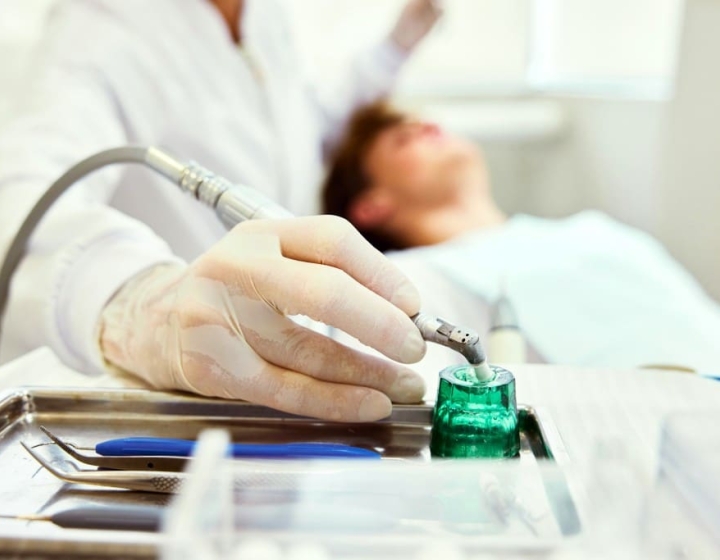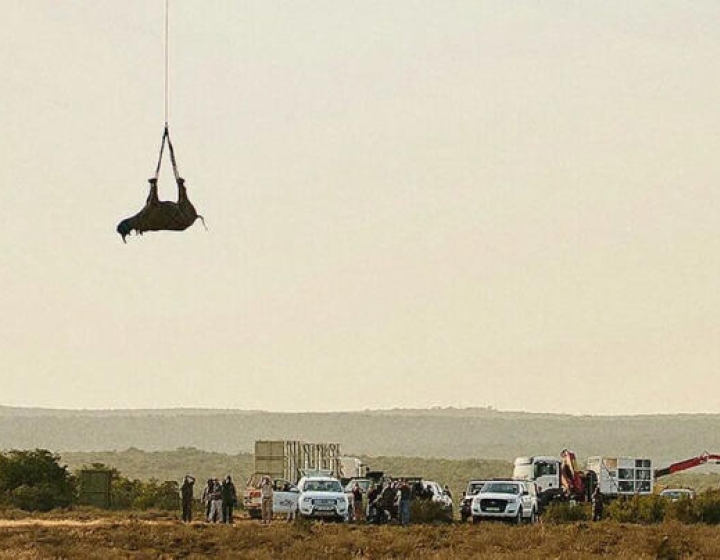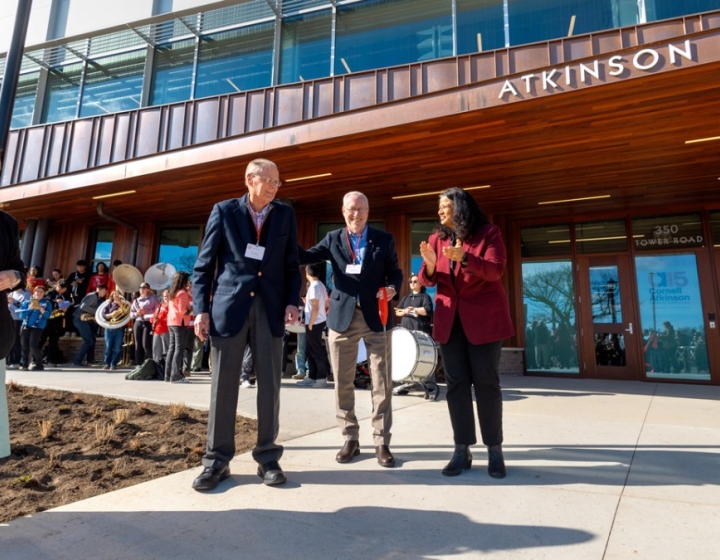Third generation Cornell alum joins veterinary clinic
You could call it "Veterinarians: The Next Generation," as grandfather, father, and son have all shaped the care at Palmer Veterinary Clinic in Plattsburgh, N.Y.
The practice was founded by the late Dr. Lynn Palmer ’50 over 60 years ago, and his son, Dr. George Palmer ’79, has worked there since 1981. This spring marked the arrival of his son, Dr. Glenn Palmer ’14. All received their veterinary education from Cornell’s College of Veterinary Medicine.
“I’m happy to be returning home,” said Glenn.
Although the homecoming might seem inevitable now, that’s not the way it felt along the way. In fact, neither Glenn nor George grew up expecting to follow in his father’s footsteps. And neither Glenn nor George decided on the career until he was in college.
“It’s an interesting similarity between my father and me,” Glenn said.
George agreed, noting: “I never had a predetermined career path."
He was in pre-med before he came to the conclusion that veterinary medicine was where he really wanted to be.
“I think it was heritage as much as anything.”
DE-QUILLED DOGS
 Likewise, Glenn started college unaware that veterinary medicine was in his future. However, his past was certainly immersed in it. For years, the clinic was run from the family home — a brick house on Route 22 in Beekmantown dating to the 1850s.
Likewise, Glenn started college unaware that veterinary medicine was in his future. However, his past was certainly immersed in it. For years, the clinic was run from the family home — a brick house on Route 22 in Beekmantown dating to the 1850s.
“I literally grew up with the clinic.”
In 1990, the current facility was built on Route 22 closer to Plattsburgh.
As a child, Glenn would feed and walk the animals in the kennels and restrain small animals when his father or grandfather needed to give vaccinations.
“I would come in after hours and help my father de-quill dogs that had encountered porcupines.”
He would also go on large animal calls with his father.
“A lot of times I was just trying to stay out of the way, but sometimes I was able to be helpful.”
FIRSTHAND EXPERIENCE
The aftermath of a devastating barn fire is one experience that he remembers vividly from when he was in middle school. His father asked if he wanted to help, warning him that it would likely be an all-night venture. Glenn agreed, and they were at the farm until the wee hours of the morning. He helped his father treat cattle that had suffered from burns, and joined volunteers rounding up the cows that had escaped the fire.
“I spent a lot of time traipsing through the woods, helping people herd the cattle back.”
Years later, when he was a student of veterinary medicine at Cornell, he found himself relating the technical and scientific knowledge that he was gaining to the firsthand experience that he had had since childhood.
CURIOUS COWS
Glenn has a special interest in dairy cows and herd management.
“Cows are curious creatures that are fun to work with," he said. "It can take a little bit of time for them to warm up to you and explore the situation; they’re a little timid — but they are curious.”
These interests are also part of the family tradition. His grandfather was a state veterinarian with responsibilities that included testing cattle for tuberculosis and vaccinating them against a disease called brucellosis.
“He was part of the contingent that has helped greatly reduced the prevalence of these diseases in the United States; both are of concern to human health as well, not to mention that they’re economically devastating to dairy herds,” Glenn said.
'UNIQUE BOND'
George, too, has enjoyed his work with dairy farms, citing what he calls the “unique bond between farmer and veterinarian, built on mutual respect.” The bond is such that nonverbal communication often develops.
“Each knows what the other thinks, and you do what’s expected of you — which might be different from farm to farm, owner to owner.”
After Glenn graduated from Cornell, he began working as a veterinarian and herd manager at a large dairy farm in central New York. He was interested in tracking herd health parameters.
NO MONOTONY
But although he enjoyed the work, it could at times be monotonous. At a general clinic, however, monotony is hardly an issue.
“I’ve been excited by the increased variation in my day-to-day responsibilities,” Glenn said.
Working with a variety of animal species and cases is “mentally stimulating and challenging.”
George and Glenn both observed that the advancement of medical knowledge across different species represents an interesting challenge for veterinarians.
There has been increased specialization as a result, especially in more urban areas, with some veterinarians opening clinics specifically for cats, dogs or more exotic species.
“I describe myself as a dinosaur mixed-animal practitioner," George said. "Most vets coming out of college now are pretty much specialists.”
However, in a rural area like the North Country, there is still a role for such dinosaurs, he said. Looking back on years of varied experiences in that role, George said, “I really regret that I never kept more of a log.
"There are so many adventures.”
PETS, OF COURSE
Sometimes, people will share stories with him of times he treated their animals that he had nearly forgotten but made a big impression upon them or upon their children.
“It’s very rewarding to hear that.”
Glenn added that despite his own fascination with dairy cows and herd management, he derives great satisfaction from working with pets and their owners, as well. He, his wife, Tara, and their daughter, Avery, have three dogs and two cats.
As a veterinarian, he said with a laugh, “it’s pretty much a requirement to have pets.”
In fact, when he was growing up, all of his pets came to him through the clinic.
“A stray would be dropped off at just the right time for our family to take in another pet.”
'NICE ACHIEVEMENT'
It was all part of growing up with a veterinarian dad and grandfather at a veterinary clinic — the clinic where he now works.
“There’s always more that goes on behind the scenes than just the names on the doorplates,” George noted, referring to the other vets at the practice “and all the support staff.”
As for the three generations of Dr. Palmers, George said, “it was never a goal.
"But it is a nice achievement nonetheless.”
Featured in the Press-Republican
http://www.pressrepublican.com/0100_news/x1927799115/Third-generation-joins-veterinary-clinic





